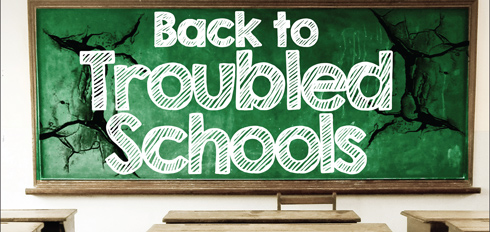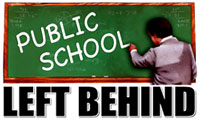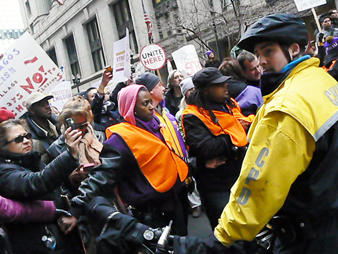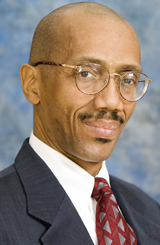By Charlene Muhammad CHARLENEM
Advocates: Parents must fight to challenge, change a failing public education system

(FinalCall.com) – Millions of Black students have begun already returning to schools across America while others are still preparing for their first day.
School closures, suspensions, funding shortages and safety are just a few issues to be faced as school bells ring.
But Black parents and advocates must monitor schools, hold political and educational leaders accountable, supplement in-school instruction and refuse to let their children go uneducated, said experts and activists interviewed by The Final Call.
Growing public school closings in major cities is a major challenge in the fight to educate Black children. Despite protests by parents, teachers and activists, a federal judge ruled Aug. 15 that Chicago Public Schools could shutter 49 elementary schools and a high school program. The Chicago Board of Education said the closures were being forced by a near $1 billion budget shortfall.
In a society consumed by racism and capitalism, public education is affected by social and political realities, said activists.
Pushing children out of school
According to Attorney Judith Browne Dianis, co-director of the Advancement Project, a national, civil rights organization, it’s hard to separate the problems Black parents and children face in education. There is a range of issues tied to systemic inequality, she said.
Problems range from how teachers are assigned to over policing of schools, to the lack of challenging, engaging curriculum, she pointed out.
Youth are still being pushed out of schools through suspensions, expulsions, and high stakes testing–all things that disproportionately impact Black children, states Attorney Browne Dianis.
The use of standardized tests to measure achievement and demand greater accountability from schools isn’t working, said advocates.
The testing helps schools push out youth who are not achieving academically, and who could drag down overall test scores–especially those who’ve been suspended, they said.
If students are not in class, they can’t learn, so they can’t pass the tests, Atty. Browne Dianis said.
These tests are also used to help determine what schools should be closed, Atty. Browne Dianis explained.
Has a system of accountability been forced upon schools, which doesn’t make them accountable to us, our community and our children? asked Attorney Browne Dianis.
It has turned out these “policies and practices are actually making our children worse off,” Atty. Browne Dianis told The Final Call.
The issue isn’t as simple as blaming teachers for failing grades, she continued. Teachers are pressured in a system that only allows children to learn what’s on a standardized test, the attorney said.
If all teachers are allowed to do is test and drill, and drill and test, children aren’t learning anything except what’s on the test, she said.

Teachers save their jobs and schools remain open, but Black children don’t learn how to be good citizens or how to have a sound, educational mind, she said.
The push for “accountability” under No Child Left Behind has left most children behind, Atty. Browne Dianis charged. Signed into law by former President George W. Bush in 2002, No Child Left Behind required states to make all students proficient in math and reading by 2014 and relies on test results. But the federal mandate came without funding and advocates say warnings against relying on testing have come true. Teachers are teaching to tests, instead of educating children, they said.
Successful schools offer great literature, experiments, and encourage reading, thinking, and creating, said Atty. Browne Dianis. “But in our schools, all they want us to do is keep your head down. Keep your pencil ready to fill in that circle. … Our children are not being prepared for college because they’ve been so focused on the test scores that we’re the losers,” she said.
School closures are one part of an effort to dismantle public services, according to Atty. Browne Dianis. “They’ve dismantled public housing. They’ve dismantled the public health care system. Now they’re coming after the schools. It’s really the last one standing,” she said.
“When you talk about we’re coming up on the 50th anniversary of the March on Washington, we have gotten away from fighting for our children. We don’t fight for our children and as a community we really have not come together and said, ‘No! Enough! … Our children are being arrested at four- and five- years-old. How are we allowing that to happen?”
School shutdowns, questions of safety

Gwendolyn Samuel, founder of the Connecticut Parents Union, encourages parents to engage their school districts and schools. On June 24, Governor Daniel Malloy signed a law to stop felony arrests of parents for school residency/zip code law violations. The CT Parents Union joined the fight to stop unjust arrests for zip code violations. Parents have been arrested and prosecuted for registering children outside of assigned school districts.
It proves the power of God in parents organizing and demanding quality for their children, said Ms. Samuel.
In the wake of school closures, safety will definitely be a concern for parents in Chicago and other cities, she said.
“Philadelphia has over 30 school closings and parents need to pay attention to where they’re going to literally be shipping their kids to,” Ms. Samuel said.
“It needs to be safety with a strong alignment with what is the quality of instruction your children are going to be exposed to because it’s not fair, especially to that child who has to walk those hallways every day, go to those restrooms, interact with those teachers, eat the school lunches.”
Children suffer when schools “are not prepared to welcome the overcrowded classrooms, or the lack of resources,” Ms. Samuel told The Final Call.
Parents have to not only make sure children are safe, but also that schools can meet their needs, she continued.
Ms. Samuel urges parents to check into school capacities, particularly where high school closures are occurring. In her state, policy approves of a teacher-student ratio of 1 to 125. “What one person do you know can manage 125 kids? I’ve got four kids and can’t manage them,” she said.
She scoffs at the idea of one person rather than a board controlling the school system, as in Chicago with Mayor Rahm Emmanuel’s governance of Chicago Public Schools.
Communities must hold on to elected school boards, and hold them accountable for ensuring the education and safety of students, she said. “When you start giving one person God-like abilities, you take the power of the people out of their hands and during the civil rights movement, people didn’t die and get hosed and get beat to get just one man or one woman power,” she argued.
“If you start with your mayor today, it could be your lawmakers tomorrow. Mess around if you want to, it’ll be your president. And mess around and we’ll be having separate faucets again, Colored over here and White folks over there,” Ms. Samuel cautioned.
“Educationally, in America, our people are in trouble! And the biggest reason we are in trouble is because we turn the education of our children over to other people,” said Phillip Jackson, founder of the Black Star Project in Chicago.
Others will never educate Black children the way they do their own, he said.
The Chicago school closures forced layoffs of 3,000 teachers and while all children will suffer, Blacks will disproportionately bear the brunt of the fall out, he noted.
‘Educate or die’
“It’s educate or die where the parents are going to have to get involved, the fathers are going to have to get involved and we’re going to have to take over the education of our children,” Mr. Jackson said.
He simply refuses to get angry because schools closed. Instead, he puts his energy in finding answers to common sense questions so Black children can progress. What are the options? What are the possibilities? How can Blacks improve upon the situation? he asks.

“They closed 50 schools in Chicago! Those schools are not coming back so the only question worth asking at this point is how are Black people going to educate Black children,” Mr. Jackson said.
His Black Star Project offers Saturday schools, outings for fathers and children, a citywide parents organization and a weekly radio show focused on Black children and education. The group spends time organizing and connecting to everyone from street gangs to religious congregations.
In 1995, 46 percent of teachers in Chicago schools were Black, by 2012, the number dropped to 19 percent, according to Mr. Jackson.
With the school closures, the numbers are approaching single digits, he said.
“The question becomes obviously, they’re coming after us. How come nobody raised this as an issue? How come nobody raised as an issue that less than 2 percent of the teachers in America are Black men? How are we going to educate Black children without Black men?” he asked.
But perhaps that’s the intention, Mr. Jackson continued. If Chicago re-opened the 50 schools tomorrow, would Black children be better educated? The answer’s no, according to Mr. Jackson.
“What we have in the schools of America is the educational slaughter of Black children, the academic and educational slaughter of Black children’s hearts, minds and spirits,” he said.
Spending time in schools, organizing parents and protecting children is a must, if children are going to be in public education, Mr. Jackson said.
So far this year, one million mostly Black fathers throughout America took their children to schools, just as they did on the first day of school each year since 2004.
The fathers, relatives, and significant male caregivers joined the Black Star Project’s back to school Million Father March and made a commitment to stay involved with their children’s education throughout the school year.
The Million Father March has also improved students’ safety, said Mr. Jackson. Having men on the scene helps to keep trouble down, he said.
While school closures struck Chicago in a major way, it’s happening all across the country, advocates noted.
Carl Pinkston, secretary of the Black Parallel School Board in Sacramento, said school closures are a way to determine who’s going to make it and who will end up with menial jobs.
The Black Parallel School Board works alongside the Sacramento City Unified District Board of Education to support the academic growth and achievement of Black students.
“The challenge is how do we break from this current education system to provide the highest quality of education for our kids?” he asked. If people help Black children, all children will rise, but currently, the system feels it’s okay not to educate the vast majority of Black children, he argued.
“It basically says we have a much more lower expectation of (Black) kids and therefore we don’t have to spend all this time, money, resources to educate these kids … inevitably because they’ll end up in the school to prison pipeline,” Mr. Pinkston said.












